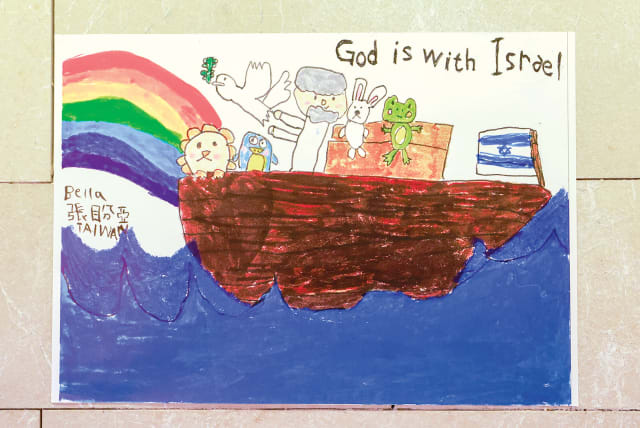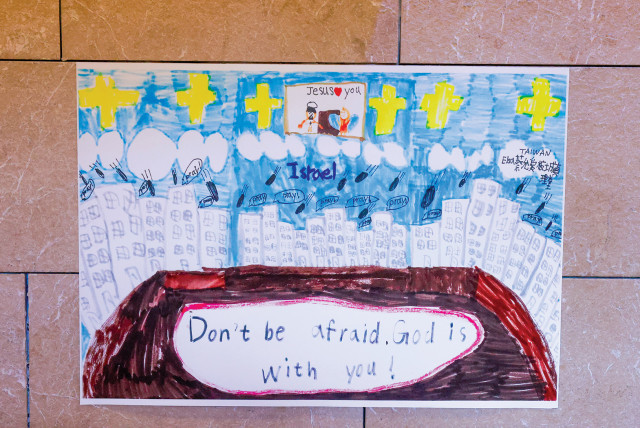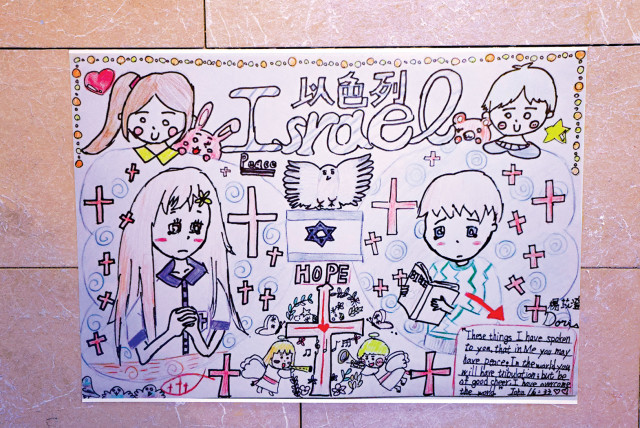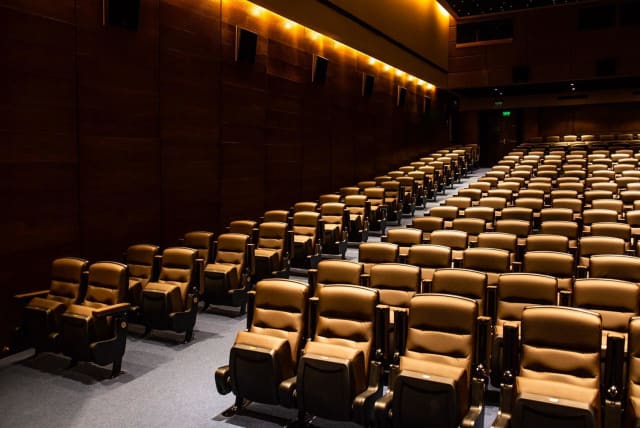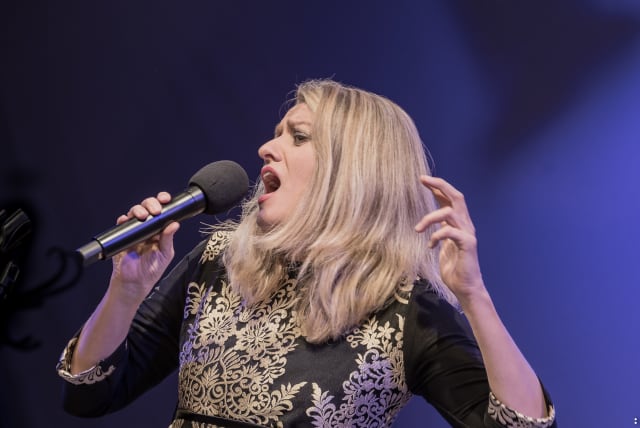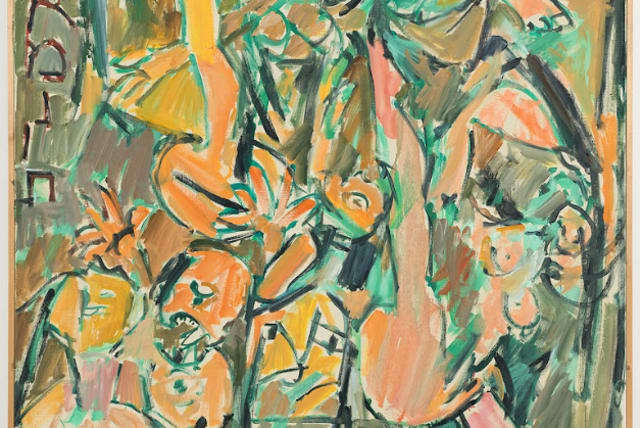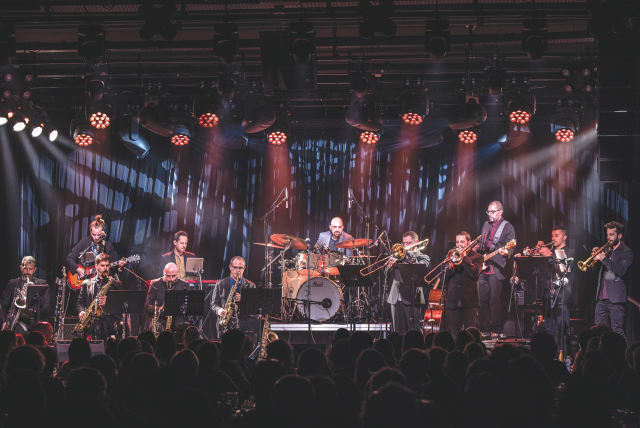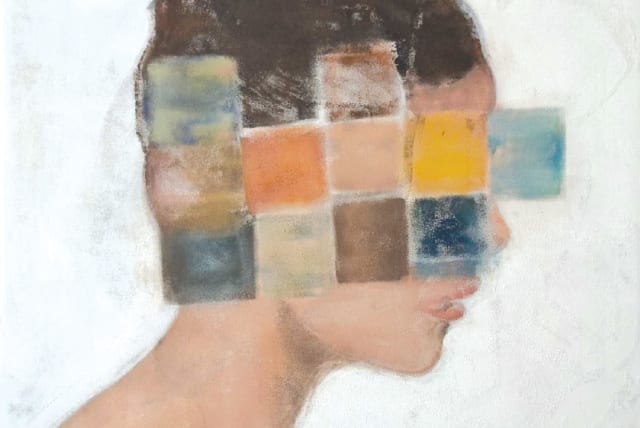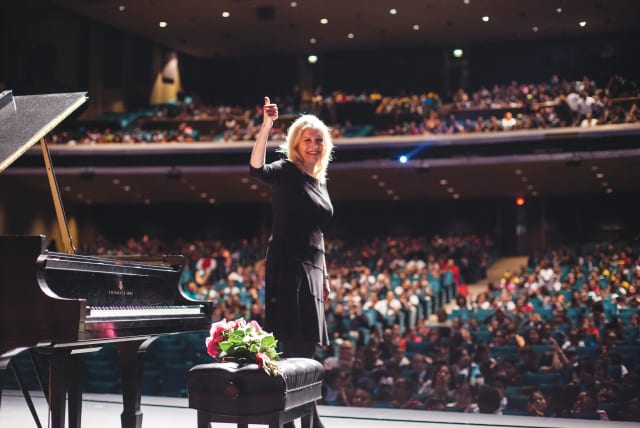Revered Nobel Prize-winning Indian poet, writer, playwright, composer, philosopher, social reformer, and painter Rabindranath Tagore once declared: “Every child comes with the message that God is not yet discouraged of man.” If that is indeed the case, we should take some sorely needed heart from the exhibition that is currently on display at the Jerusalem Cinematheque.
The show, which is taking place under the shared auspices of the embassies of Taiwan and the Czech Republic, features paintings and drawings by children aged five to 12 from both countries. The delightful works, simply put, offer fittingly innocent messages of love, goodwill, and blessings to Israel in the wake of the October 7 massacre and the ongoing war in Gaza.
It also makes for eye-catching, heartwarming viewing, with 30 works spread the full length of a wall on the second level of the Cinematheque. There are bright pictures, awash with color. Others have a more minimalist chromic palette, some are busy, and some are more spartan. But all convey good, pure, life-affirming intent and energies, as befitting the unsullied apolitical outlook of children.
The engagingly emotive initiative started out as nothing more than a simple exercise in youngsters expressing their feelings and thoughts about the tragic events here, and the indescribable cruelty vented by Hamas terrorists.
“It actually started very spontaneously,” said Czech Ambassador Veronika Smigolová. “Some friends sent us some pictures that their kids drew in support of Israel.” Things picked up from there. “We thought this is a great idea, and it would be nice to have more of those drawings.”
Word was duly sent out to the relevant quarters in the Czech Republic. “We contacted some schools and asked if they would be interested in sending us some pictures, and they did,” Smigolová added. The response was quite overwhelming. “They sent us more pictures than we could have in the Cinematheque, so we have put up a sample.”
Keen to spread the good, honest word, the folks from the Czech diplomatic contingent decided to make the artwork available to Tel Aviv residents as well. Copies of the Czech children’s drawings have been put up on the fence around the Czech embassy on Zeitlin Street, near the Tel Aviv Museum of Art, presumably sheltered from the recent impressive show of precipitation.
“People who are walking around town can, maybe, have a little warm feeling in their heart when they see them,” Smigolová suggested.
Good wishes from afar
Interestingly, there are some words in Hebrew in some of the Taiwanese kids’ pictures, such as “Shalom,” and even a short sentence in Hebrew, Taiwanese, and English that reads “May God bless all people.” Amen.
The information provided by the Taipei Economic and Cultural Office (TECO) in Tel Aviv notes the importance of the collaboration with the Czech embassy in presenting the exhibition “that features a myriad of blessings and drawings from schoolchildren in Taiwan to express their good wishes to Israel at war.”
Against a backdrop of anti-Israel and antisemitic vitriol, and generally hostile political opinion directed toward Israel, any show of empathy and support for us in our time of trial is appreciated.
The 16 pictures sent from Taiwan come from seven schools there, all with a clearly strong religious Christian ethos. “These children use bright colors, lively characters, and simple Hebrew to convey a very strong message that ‘We stand with Israel,’” the Taiwanese exhibition text reads. “By presenting this display, TECO in Tel Aviv wishes to bring hope, human kindness, and support to Israeli friends and pray for the release of hostages, believing that together we could go through these challenging times.” Who could ask for more than that?
Taiwanese Ambassador Abby Lee, who attended the opening ceremony at the Cinematheque on November 16, said she and her crew were eager to extend a supportive hand in our direction. “Even though Taiwan and Israel are about 8,300 kilometers apart, we feel close, emotionally. And Taiwan is one of the best countries to identify with Israel. Our people also show they care about each other.”
Lee says she was more than happy to jump on the junior-sparked Czech peace-inducing bandwagon. “My understanding is that every year, the Czech Republic has an exhibition at the Jerusalem Cinematheque. It was meaningful to have this schoolchildren exhibition. The Czech embassy contacted my office to bring up this initiative, and we joined it without any hesitation.”
In fact, the collaborative die had already been cast. “They [Czechs] heard we also had this type of drawings, made by schoolchildren, collected by our office,” Lee continued, “so they invited us to join the exhibition.” Seems there was a previous unsolicited outpouring of love and positive vibes from young Taiwanese. “We received a lot of drawings from children in Taiwan, to give to their peers or pen pals here in Israel.”
That sounds like a delightful endeavor certainly worthy of street-level display and sharing with us while we continue to take on negative media fallout across the globe. “These drawings are a kind of message to the children here. We think these drawings are very inspiring and very encouraging, not only for schoolchildren but for all people.”
After viewing the works at the Cinematheque earlier this week, I can vouch for that.
Everyone benefits
Lee got a sense of that for herself. “At the opening ceremony, some visitors to the Jerusalem Cinematheque were already so appreciative. They were so touched by those innocent messages and powerful pictures.”
The ambassador feels there are overarching benefits to be gained from the artistic initiative. “After the October 7 massacre, a lot of people lost trust in humanity, and we feel it is important to bring that missing piece to everyone. And Taiwan is always with Israel.”
The chosen creative age group, said Lee, helps to bridge any cultural, linguistic, or religious gaps there may be across the geographic divide. “There are a lot of [Israeli] children held in captivity by Hamas. They are still hostages,” the ambassador noted, also referencing the auspicious global date on which our conversation took place. “Today is [United Nations] Children’s Day. We also went to express our best wishes to all the children and women who are hostages to return home safely.”
And this, tragically, in the wake of the scenes of extreme violence witnessed by young Israeli hostages who are being held in inhuman conditions. The emotional scars they already bear will take a long time to heal, if ever. But maybe, just maybe, when they hopefully return to us, such palliative offerings may help to soothe some of the pain.
That is surely a sentiment to which any parent, the world over, can subscribe. Ambassador Smigolová certainly thinks so. “This is such a terrible situation. I have three children myself. They are all grown up, but I cannot imagine what I would do in such a situation if they were kidnapped by terrorists, and I wouldn’t know what was happening with them. And there are children [hostages] who are there [in Gaza] without their parents. It is absolutely crazy.”
Presumably, particularly in this day and age when youngsters have access to sights and sounds from which they would probably have been protected in the pre-Internet era, until they had matured and were capable of safely processing them, kids have a need to let off some emotional steam from time to time. In all probability, children and youth elsewhere around the globe saw some of the video footage of the horrific acts of bestiality committed by the Hamas terrorists a month and a half ago. That has to leave some kind of negative imprint on their young, tender psyches which, if not addressed, could fester and spawn emotional damage in the long term.
Smigolová said the artistic initiative provides one way of dealing with that on an individual basis, and also reaching out to peers over here. “I didn’t study psychology, but I believe that for Czech children, when they think about a war, about something terrible that happened to children far away, it [the drawings] is a possibility to empathize, to think about that not all children all around the world live in such luxurious peaceful times as they do.”
Perhaps that can have a curative knock-on effect over here. “I hope for the children of Israel who are traumatized by what happened on October 7, that it can help them if they see messages from children from far away, that it can help them to feel better, to see they are not alone, that other children are with them.”
Sadly, as we know, as has been the case for far too long, acts of violence and warfare are the not private domain of any particular region of the world. The border-leaping detritus is all too present elsewhere, particularly in Ukraine.
Four Czech children – Fred, Pokoj, Mir and Baris – got that in outing together an attractively skeletal drawing that sports three characters, each with Czech, Israeli, and Ukrainian flags fluttering above their heads. I didn’t understand the Czech bubble text from the figures standing beneath the Ukrainian flag, but the words “peace” and “shalom” in Hebrew imparted the children’s wholesome unambiguous intent. “I especially like that picture,” Smigolová exclaimed.
These contributions by young Czechs to bolstering the national spirit follows recent official visits and expressions of support here by Czech Prime Minister Petr Fiala, and Foreign Minister Jan Lipavsky.
“The Czech Republic is definitively very supportive of Israel. It is a longtime tradition, the policy of the country and the [Czech] people. All the governments we have had since the fall of communism are very supportive of Israel,” Smigolová noted. That may, she suggested, stem from a sense of shared identity and political circumstance. “We feel a sort of kinship with Israel. We have kind of a similar fate – small countries surrounded by countries that are not always friendly neighbors.”
The ambassador says she doesn’t get the present tirade of anti-Israel resounding around most parts of the globe. “I must say, I don’t really understand how, in this current situation, somebody cannot support Israel. If there are any situations that are very black and white, very clear cut, it is this one.”
The ambassadors’ heartwarming words, the support of their governments, and, most touchingly, their school kids there may not bring the hostages home or put an end to the war just yet, but they do offer a well-timed, much-appreciated tonic. ❖


